December 02, 2022
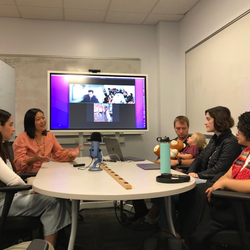
Dr. Xinru Page is a member of the Computer Science faculty and has been here at BYU for the last three years. Prior to joining the university, she taught at Bentley University. Dr. Page holds a Ph.D. in Information and Computer Science with a concentration in Informatics from the University of California, Irvine, and B.S. and M.S. degrees in Computer Science with a specialization in Human-Computer Interaction from Stanford University. She directs the Social Technology and Privacy Lab on campus which conducts research on human computer interaction.
Dr. Page has several students who work as researchers in the lab, and they are on various teams that do research in the realm of social technology and privacy. Some of those teams include Human-Algorithm Interaction, Technology Adoption and Nonuse, and Understanding Individual, Developmental, and Cultural Differences in Privacy Attitudes. Lab meetings are held every Thursday, and the teams meet together with Dr. Page to get feedback on the results of current studies, discuss issues and opportunities posed by new technologies, and even practice giving presentations. Lab meetings begin with a prayer and a spiritual thought, as is customary at BYU. Dr. Page explains that she enjoys doing this because everything is connected, both religion and research, and keeping them integrated in her life makes things "feel whole."
One main study that Dr. Page has recently published a paper on identifies the unintended negative consequences when young autistic adults interact on social media. Social media is a technology that has connected the world and provided opportunities for innovation and maintaining relationships, but for those who view and navigate the world differently, it has the potential to mislead users and lead to dangerous situations. Autism is a form of neurodiversity, and those on the Autism Spectrum have communication, social, and behavioral differences, which carry over to interactions online. There has been very little prior research on this subject.
In Dr. Page’s research, she and her team performed a lot of ethnographic fieldwork. This included interviews with autistic youth and their parents, as well as social service providers who interacted with those on the autism spectrum. They also participated in and observed workshops on social media as well as life skills in general. They focused on understanding how autistic young adults utilized the main affordances of social media, namely, sharing user-generated content, consuming user-generated content, connecting with others, and networked interactions. The research sought to understand how these autistic young adults used these affordances, what the consequences of this use were, and what could be done to redesign a more accessible system.
One observation made in her research was that a large reason for Autistic users to perceive affordances differently was the literal interpretation of the interface. This leads these users to view and share media differently. For example, some neurodivergent individuals would disclose personal information, like a phone number or email address, just because there were fields that asked for this information (even though a neurotypical interpretation would recognize these as optional fields). Another way this is harmful is when a literal interpretation is applied to prompts and labels found on social media. Facebook typically asks users to share 'what’s on their mind,' and this can lead to some oversharing feelings or publicly expressing dislike for someone or something. One staff member interviewed shared this: "They’re going onto Facebook at night and, ‘I hate my job,’ and, ‘I hate this person.’" For these neurodivergent individuals, they were doing what they thought was appropriate by following the platform's instructions. However, interpreting and following prompts literally often proved harmful to their relationships and personal safety.
One especially problematic issue was the label of ‘friend’ on social media. Rather than understanding this as a way to connect with people you already know, it was taken as an invitation to become a friend, and some of these individuals assumed a deeper relationship with this ‘friend’ than they actually had in reality. One participant shared, "I thought I was her friend, but she said, ‘You’re not because we don’t know each other well enough.’"
Dr. Page and her students have also been working to find effective ways to change the design of social media and online technologies to be more inclusive of this population. They determined that prompts and labels need to be more direct, with less ambiguity and safety in mind, and that more social guidance needs to be provided to these neurodivergent individuals. Kirsten Chapman, a student working with Dr. Page, shared that one project in this inclusive design she had worked on was adding a questionnaire to the friend request feature of social media. Questions would be asked to help neurodivergent individuals determine whether they actually knew the person and if it made sense to add them as a connection online.
Check out the News tab to see other cool stories!
October 19, 2022
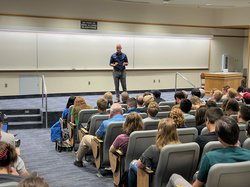
Have you heard of Infinity Blade? How about Advent Rising or Fortnite? Geremy Mustard is the co-founder of ChAIR Entertainment, which was acquired by Epic Games in 2008, and through that position has been a collaborator on many of their projects including the blockbuster Infinity Blade. He has served as co-creator of Xbox game Advent Rising and helped to create Fortnite, which changed the gaming industry.
On Thursday, October 13, 2022, the Computer Science department hosted Geremy Mustard for an alumni lecture, and he talked about his career in the industry and in game development. The event was very successful, with every chair filled. Each week, we have a lecture, so check out our events tab for this week's!
Check out the News tab to see other cool stories!
October 10, 2022

Wednesday, November 2nd at 12pm, TMCB 335
Advisor: Dan Ventura
MS Thesis Defense/PhD Qualifying Process for Jonathan Demke
September 29, 2022
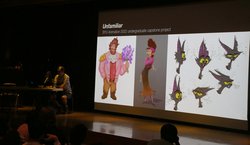
The Realtime Rendering Summit was sponsored by University of Utah, SideFX and Epic, and BYU animation students were invited to present at the weekend event (Sept. 23-24). Located on the campus of the University of Utah, this event was a summit of industry and academia from around the state of Utah and beyond. The 2 day event consisted of case studies, panels, student reel reviews, evening social activities and even a live Houdini / Unreal art battle!
The presenting students were Zach Wood and Anna Hales. They presented their work on Software Agnostic USD usage in a small studio or academic setting, which is a reflection of a part of the work that is being done on this year's Animation Film capstone.
Check out the News tab to see other cool stories!
September 16, 2022
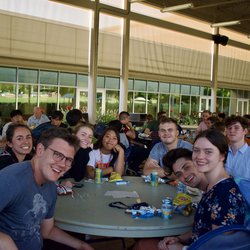
The Computer Science department Kickoff took place on September 8, and had a turn out of approximately 300 current and prospective students. Activities included club booths, Frisbee, J-Dawgs, and a raffle!
Stay tuned for future events on the CS Instagram page: @byucomputsci
June 16, 2022

Professor Dan Ventura and a team of colleagues from Idaho State (Paul Bodily a BYU CS alumnus, Jon Armstrong, and Claire Smedley-Dye ) recently entered an international AI song contest and found out that they made the finals. Listen to team Pop*'s song here: https://www.aisongcontest.com/the-2022-finalists.
CS Professor and team from Idaho State are AI Song Finalists!
June 01, 2022
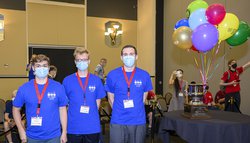
The BYU team consists of Braydon Hunt, Teikn Smith and Lawry Sorenson with Dr Ryan Farrell as their advisor.
The NAC (North American Championship) this last weekend was to determine which teams would advance to the world finals.
April 25, 2022

She’s a great support to the chair. She’s been willing to take on tasks outside her job description to help the needs of the department.
Erin Rowan is the Department Secretary in Computer Science. She handles financials, supports faculty recruiting, and trains part-time staff and students.
March 23, 2022

It's still unofficial how many teams from each region will advance, but our team that came in 2nd place will probably go to the North American Championships in late May to compete against the top teams in the US and Canada (there are some really, really good teams there!). Sadly, only 1 team per school can go, so even if they allow a 3rd team from our region, we cannot send both of our top teams... which is heartbreaking given how close the two teams were (only 2 mins!).
BYU Computer Science teams claimed both 2nd and 3rd place in the regional programming competition. Our team in 3rd place was only 2 minutes behind our team in 2nd! We had two really strong teams. You can see the full results (now finalized) here: https://rmc21.kattis.com/standings
March 14, 2022
Friday, April 1st at 1-2:00pm, Summit Room 3346 TMCB
Advisor: Dan Ventura
Reed Perkins MS Thesis Defense
March 04, 2022

"Their short animated film, “Stowaway” was nominated for a student Emmy for Best Animation, and the winner will be announced next month at the College Television Awards." from https://www.ldsliving.com/this-short-film-directed-written-and-produced-by-latter-day-saints-was-just-nominated-for-a-college-emmy/s/10461
Students from the BYU Animation Program received 4 of the 16 nominations, more than any other school.
March 03, 2022
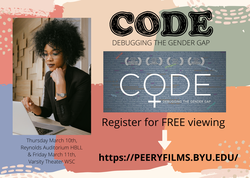
Register for FREE viewing at PEERYFILMS.BYU.EDU! Thursday, March 10th Reynolds Auditorium HBLL & Friday, March 11th, Varsity Theater WSC
February 28, 2022
Wednesday, March 16th at 12-2:00pm, on Zoom
Meeting ID: 974 5563 5628
Meeting Passcode: 128976
Advisor: Yui-Kai Ng
Joseph Bills MS Thesis Defense
February 14, 2022
Wednesday, March 2nd at 3-4:30pm, Summit Room 3346 TMCB
Advisor: Dan Ventura
Robert Morain MS Thesis Defense/PhD Qualification
February 04, 2022
Wednesday, February 9th at 1pm, Summit Room 3346 TMCB
Advisor: Chris Archibald
MS Thesis Proposal for Jamison Moody
January 27, 2022
Wednesday, February 2nd at 2pm, Summit Room 3346 TMCB
Advisor: David Wingate
MS Thesis Proposal for Josh Robinson
January 19, 2022
Thursday, January 27th at 3pm, Summit Room 3346 TMCB
Advisor: Kevin Seppi
MS Thesis Proposal for Courtni Byun
December 13, 2021
Friday December 17 at 11:00 a.m., 2222 TMCB
Advisor: Sean Warnick
MS Thesis Proposal for Neal Munson
December 06, 2021
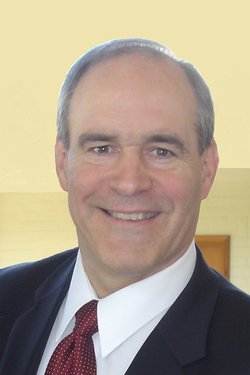
Before joining the BYU CS department, Steve worked for 10 years at the Church of Jesus Christ of Latter-day Saints, where he was the Manager of Machine Translation (MT) and Translation Systems. Prior to working at the Church, he presided over the Brazil São Paulo South Mission with his wife Marianna. Before the mission, he worked for 17 years at Microsoft Research as a Principal Researcher and manager of the MT Group and for 11 years at IBM, including at the TJ Watson Research Center, focusing on natural language processing (NLP).
We are excited to have Dr. Steve Richardson join the faculty.
November 17, 2021
Wednesday, November 17th at 3pm, Summit Room 3346 TMCB
Advisor: Jacob Crandall
MS Thesis Proposal Abstract for Michael Richards
November 08, 2021
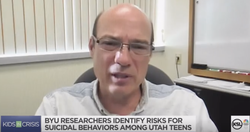
If counselors could predict which kids are most likely to commit suicide, they could save lives. Researchers from Brigham Young University, Johns Hopkins and Harvard have come up with an algorithm that predicts suicidal thoughts and behavior among adolescents. Their findings could lead to more effective measures to prevent suicide. (From https://ksltv.com/476011/byu-researchers-create-algorithm-to-predict-suicidal-thoughts-in-adolescents/)
“I’ve had close friends that have had suicides in their family. For me, it’s kind of personal that way,” said BYU computer science professor Quinn Snell. “Our lab had been looking at suicidality and suicide ideation for quite a little while.” (Quote from https://ksltv.com/476011/byu-researchers-create-algorithm-to-predict-suicidal-thoughts-in-adolescents/)
November 04, 2021
Friday, November 19th at 1pm, 3350 TMCB
Advisor: Nancy Fulda
MS Thesis Defense for Berkeley Andrus
October 20, 2021

Brett Decker received a BS in Computer Science from Brigham Young University in 2012. He then was hired full-time at Sandia National Laboratories (SNL)---he first started working for SNL as a student intern in 2010. As part of SNL’s Critical Skills Master’s Program, Brett obtained a MS in Computer Science from Brown University in 2015. At SNL, Brett has been a software engineer, architect, and lead on various secure embedded and PC software systems. Brett came to BYU in Fall 2019.
I have a lot of hobbies, though I'm not good at all of them: reading, gardening, basketball, racquetball, board game design, piano, banjo & anything my kids are interested in.
October 11, 2021
Thursday, October 21st at 3pm, Conference Room
Advisor: Casey Deccio
MS Thesis Defense for Alden Hilton
October 06, 2021
Thursday, October 21st at 3pm
Advisor: Jacob Crandall
MS Thesis Defense for Tim Whiting
September 11, 2021

Dr Eric Mercer was the 2021 Amazon Research Awards recipient in AUTOMATED REASONING.
Mercer wins coveted Amazon Science Award
September 08, 2021
Monday September 13th at 2pm
Advisor: Mark Clement
MS Thesis Defense for Brandon Bingham
July 23, 2021

Friday July 30 at 10am
Advisor: Mark Clement
MS Thesis Defense for Eric Burdett
June 19, 2021

David is a recent graduate of the University of California Santa Barbara in the Electrical and Computer Engineering Department. His research interests are centered on multiagent systems, game theory, distributed optimization, mechanism design, and security, however, he’s genuinely open to new domains of thinking which may challenge his assumptions or deepen his appreciation of current understanding. Alongside his academic pursuits, he has been able to work in industry for Applied Invention and MIT Lincoln Laboratories, allowing him to apply theory to several industries, including agriculture, national defense, travel, security, and aerospace. He has also been a leading member of Achilles Heel Technologies, a startup company applying systems theory to the security of critical infrastructures.
In his spare time, David enjoys watching and playing sports – really anything that’s active and strategic. He’s excited to be here at BYU with his wife, Kalisha, and his four children: Rose, Harvey, Elaine, and Walter.
June 15, 2021
Thursday, July 8th at 11:00am, 3350 TMCB
Advisor: Kevin Seppi
MS Thesis Defense for Roland Laboulaye

